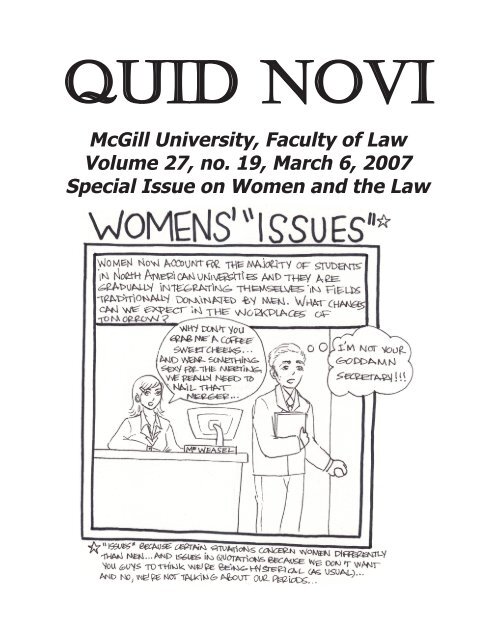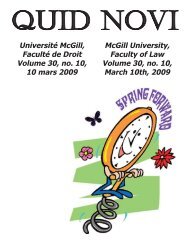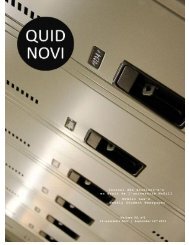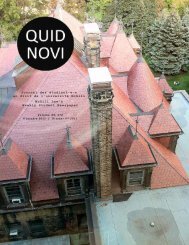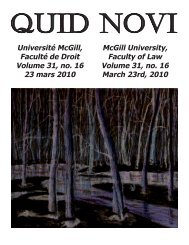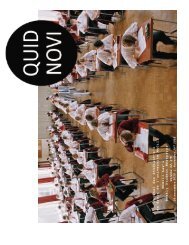You also want an ePaper? Increase the reach of your titles
YUMPU automatically turns print PDFs into web optimized ePapers that Google loves.
<strong>QUID</strong> <strong>NOVI</strong>McGill University, Faculty of LawVolume 27, no. 19, March 6, 2007Special Issue on Women and the Law
<strong>QUID</strong> <strong>NOVI</strong><strong>QUID</strong> <strong>NOVI</strong>3661 Peel StreetMontréal, QuébecH2A 1X1(514) 398-4430quid.mcgill.caEditors in ChiefCaroline BriandAndrea GorysAssistant Editors in ChiefCassandra BrownJulien MorissetteManaging EditorsKarina KesserwanYuri SmagorinskiLayout EditorsAlison AdamRaffaela CommodariTara Di BenedettoMaegan HoughNaomi HauptmanAssociate EditorsBruce CarliniLauren Chang MacLeanOana DoleaThomas LiptonVrouyr MakalianPalma PacioccoColin SchulhauserLéonid SirotaStaff WritersNick DoddAlison GlaserRyan KirshenblattOlivier PlessisStaff CartoonistLaurence Bich-CarrièreCover ArtistIsabelle CadotteIN THIS ISSUE...3... The Square: Me & MyPatriarchy4... Law Blurb6... The Saddam Trial: WasJustice Served?7... Lessons on How toMake Small Talk8...Le jardin à l’envers12... BLSAC Conference: ACommunity Affair13... Women in the Law: APrecarious Life14... Les Aventures du CapitaineCorporate America:Accusé de déception14... Confessions d’uneféministe15... MiraculumWhy a Special Issue onWomen and the Lawby Caroline Briand (Law IV)Co-Editor-in-ChiefWelcome to the Quid’s first (and hopefully annual)special issue on Women and the Law! Why thisspecial issue? After all, it’s the first week of March,and we have all realized that the end of the term is quicklyapproaching, that we aren’t exactly up to date in our readingsand/or summaries, and that we’re in the middle of theMontreal recruitment process.Nevertheless, we figured that our little community couldtake a little time to reflect on women’s (legal) issues andon the role of women in law, given the proportion of femalestudents and law professors at the Faculty, and given thatmale students and law professors necessarily have to interactwith us women, and are thus presumably as concernedas we are with those issues.Although some people (including the Conservative government)seem to be living in a state of blissful ignorance andbelieve that equality between men and women has beenachieved and that feminism is now irrelevant, there is still along way to go before we reach this goal, and before menand women truly treat each other as equals.This lack of awareness of, or wilful blindness to the prevailinginequality between the sexes is deeply rooted in our society,to a point where even blatant manifestations ofsexism are often tolerated and even trivialized.Take the example of Belinda Stronach’s adventures in politics.She is articulate, wealthy, ambitious and opportunistic.She has multiple ties with powerful people in various industries,as well as in other spheres of public life. In short,she’s your average politician..The Quid Novi is published weekly by the students of the Faculty of Law at McGill University.Production is made possible through the direct support of students.All contents copyright 2006 Quid Novi.Les opinions exprimées sont propres aux auteurs et ne réflètent pas nécessairement celles de l’équipe du Quid Novi.The content of this publication does not necessarily reflect the views of the McGill Law Students’ Association or of McGill University.Envoyez vos commentaires ou articles avant jeudi 5pm à l’adresse: quid.law@mcgill.caToute contribution doit indiquer l’auteur et son origine et n’est publiée qu’à la discrétion du comité de rédaction, qui basera sa décisionsur la politique de rédaction telle que décrite à l’adresse:http://quid.mcgill.ca/epolicy/html.Contributions should preferably be submitted as a .doc attachment.2
But she’s a woman. Shewears skirts and fitted suits.Pink suits. And she isblonde. Although she hastwo children, she preferredher career in business tothe apron, the church bookclub and the cat fosterhome, she has divorced…twice! And guess what? Shedates men, and some evensay that she has sex withthem. Ever heard of that?Politicians having a life, notdressing as if their mompicked their outfit, datingand having sex? Ewww!Because she is a woman,Ms. Stronach’s crossing thefloor to the Liberal partywas considered as hightreason. “Blonde Bombshell”,commented the NationalPost. Some MPs calledher a “dipstick”, and wentso far as to say that shewas “whoring herself to theLiberals”, though theyadded that such commentsThe Square: Me & My Patriarchyby Nick Dodd (Law II)were not in any way discriminatory,and that theywould equally apply to maledefectors. (Strangelyenough, I don’t rememberanybody uttering similarlysexually-charged insultsabout Scott Brison or GarthTurner.)In my opinion, thoseevents, including the subsequentcomments of PeterMcKay who called Ms.Stronach “a dog” and ofRalph Klein concerning Ms.Stronach’s …uh… bones,should alarm every concernedCanadian citizen forthe following reasons:1) Misogynistic dinosaurslike the MPs who viciouslyattempted todemean Ms. Stronachthrough sexual slurs areamong the people who getto vote on legal issues thatimpact on women. I personallywouldn’t trust anyonelike Mr. MacKay, a man whostill can’t get over the factthat his then-girlfriend mayhave different opinions thanhim, to make wise and respectfuldecisions concerningmy relationship with myuterus, the extent to whicha defence lawyer would beallowed to expose theminute details of my sexualhistory for everyone to see,or, should I decide ever toreproduce, my ability toraise my litter and pursue afulfilling career withoutbeing reminded that childrenare but a “lifestylechoice” for which careerwomen – and femalelawyers, for that matter –don’t deserve a special taxtreatment.MARCH 6, 20072) The people who utteredthose sexual slurs didn’teven get a slap on thewrist. No exclusion from thecaucus, no public disapprobationfrom the party’s leaders.On the contrary, manycheered, and happily joinedthe slaughter. Organizationsought to be accountable totheir constituents and to thepublic at large when theirmembers get out of hand,and start running aroundchanting sexist slogans (e.g.“NO MEANS have aNOtherbeer”), cracking insensitiverape jokes or scatteringother forms of genderbasedhate speech.3) More importantly:Where was the public outcry?If we do believe, as apeople, in egalitarian values,and in the importanceof eradicating all forms ofdiscrimination, surely weought to protest fiercelyagainst it when it’s lookingat us in the face. As a matterof fact, such silence isoutrageous, and this socalled“tolerance” or “respectfor free speech”,cruelly misplaced. For a long time, duringmy youth and youngmanhood, I thought mymom was crazy. While sheoften seemed to run thehouse like her personal fiefdom,she still managed tooccasionally get upset abouthow no one respected her, orcared about her wants andneeds. “Respect her?!” Iwould demand incredulouslyto friends, brothers, my father,“all we do is respecther!” “Wants and needs,” Iwould cry, “we always haveto do everything the way shewants.” I believed thateveryone in the housemarched to my mother’stune. My proof positive wasthat if she was upset, thehouse was quiet whereas ifshe was happy, everyone feltok being rambunctious.I had learned to be a patriarch.Perhaps not as overt apatriarch as one can imagine,but a patriarch nonetheless.I learned it at home, inschool, from the television Iwatched and the music I listenedto. This is why I feltok getting angry with mymother when she, for example,was a half-hour latepicking me up from rugbypractice. Didn’t she knowthat I had important thingsto do? And how could shecondemn me for my righteousanger?! If I was goingto succeed in this world, Iwas going to have to get myhomework done!Rarely did I give thought tothe fact that my mother hadgone to work at 7am just soshe could leave early andbrave the rush-hour traffic toarrive just in time to pick meup. Never did I wonder whymy father wasn’t makingsuch sacrifices. My understandingof gender roles waswhole, complete, and, despitethe efforts of somearound me, including mymother, staunchly unchallenged.Scary stuff.Last month the Gazette ran aweeklong special on womenin the workforce. In short,the question it was askingwas [note: editorial honestyto follow] how a societybased on patriarchy and specificgender roles was goingto adjust to the (glaciallyslow) transfer of economicpower (through, for example,education) from men towomen. What will happen,we were asked, when themajority of our labour forceis saddled with the heavyburden of the domestic workthat currently accompaniesthe female gender role? Willthe fundamentals of theworkforce have to change?Or, as has been happeningfor the last century, willwomen just be expected toshoulder the extra role 3
<strong>QUID</strong> <strong>NOVI</strong>as primary provider in additionto all the other roles shehas already been forced toaccept?This exact issue arose in arecent Refugee and ImmigrationLaw class, in relationto our discussion of the liveincaregiver provisions of theIRPA. One of the things thatcame out of this class is that,while the above questionsstrike at the fundamentalfunctioning of Canadian societyas a whole, these issuesreach their logical extreme inthe field of law. The law firmworld is structured aroundstrict understandings of genderroles. As a lawyer, yourdedication to the firm is absoluteand you are expectedto put in 12, 14, 15-hourdays without question.What, in the past, has allowedthis model to function?The fact that said lawyer(male) could rely on his partner(female) to take care ofpesky details like food provision,cleaning and child rearing.Such tasks are still,either explicitly or implicitly,labeled “women’s work”, andwhen a man undertakes toperform such roles it is understoodto be the exception.But what will happen whensaid lawyer, as well as a majorityof her peers, is female?Will the expectations be thesame? Judging by a recentcover of one of those horriblelaw rags that litter the basementof the NCDH (presentpublication excluded, ofcourse) which featured the‘Top 50 lawyers under 50’ orsomething like that, thereare still a lot of white malefaces out there with a vestedinterest in exactly this structure.But again, puttingaside the vested interests(and recognizing impossibilityof that) where and howcan change begin?Audrey Macklin, in an articleentitled “On the Inside LookingIn: Foreign DomesticWorkers in Canada,” suggeststhe following:“A just solution to thedilemma of career and familywould involve, at a minimum,equally distributing responsibilityfor child rearing acrossthe sexes, whether withinthe nuclear family or throughsome other 4 arrangement.It would also meantransfiguring the workplaceand its priorities away fromits anachronistic model of themale breadwinner with thestay-at-home housewife. Finally,it would require thestate to assume a greater responsibilityin making childcareavailable and affordableto all women and in payingthose who do it a decentwage.”While I strongly support theabove suggestions, I cannothelp but feel that somethingis missing from this formula(and I don’t think the authorwould disagree). I thinkabout my mother, how mybrothers and I have treatedher, what we expected andexpect from her, and aboutthe slow, continuing processof exorcising my inner patriarch.Beyond the suggestions ofthe above quote, and in factbehind them, is a requirementthat each of us confronthow we re-enforce andre-inscribe, in our daily interactions,the gender roles thatwe have, to a greater orlesser extent, internalized.This act of subversion is, forthose who were brought uplike me, difficult, complicated,and bound to bemarked by failures along theway. The only reason I havemade any progress at all isdue to the patience, strengthand understanding of a fewamazing people in my life.While very challenging, thistask is, for those raised as Iwas, probably the most importantthing we can do forthe women in our lives.Even if taking on this obligationcannot set-right thetimes that I deeply hurt mymother, perhaps it will ensurethat I do not do so anylonger. And for all the incrediblewomen in my life,it’s the least I can do.Law Blurboverheard by Olga Puigdemont Sola (Law II)Friday before winter break, McGill Faculty of Law basement, two inquisitive law minds at work conjecture on thenotion of judicial authority upon the illustrious occasion of US Supreme Court Judge Scalia’s speech that afternoonfor the Charter at 25 conference....A) Did you know that he [Scalia] is very right wing, right?B) Yeah, I was really worried about going because I was scared that I would vomit during the presentation... (vomitingsound)A) You should go...it is important to hear these people speaking.B) Yeah...that is what Student C said, but I told him I would only go if I could whisper jokes in his ear during the speech.A) aoooaooaoaooaoa.....B) No, no, seriously, I am not judging him...[LONG PAUSE]... I mean, that’s clearly his job.4
6 MARS 20075
6<strong>QUID</strong> <strong>NOVI</strong>The Saddam Trial: Was JusticeServed?by The McGill International Law SocietyOn January 29, theMcGill InternationalLaw Society, with thesupport of the Dean’s DiscretionaryFund, hosted anevent titled: “The SaddamTrial: Was Justice Served?”The event featured ProfessorNehal Bhuta, author of theHuman Rights Watch Report,Judging Dujail: TheFirst Trial Before the IraqiHigh Tribunal and currentlyAssistant Professor of Law,teaching courses in internationalhuman rights law atthe University of Toronto.The talk led with an introductionby Professor PayamAkhavan.Professor Bhuta has beenstudying justice issues inIraq since 2003, and spentfour weeks in Iraq observingtrials and researching theIraqi Special Tribunal. Heled his talk with a short answer.Was justice served inSaddam Hussein’s trial? No.According to Human RightsWatch, the trial before theIraqi High Tribunal wasmarred by a plethora of flawsthat made the ultimate verdictunsound. Specifically,Bhuta pointed to three mainconcerns: procedural problems,administrative difficulties,and substantiveproblems.Procedurally, the independenceof the Iraqi Tribunalwas undermined by interferenceof Iraqi government officialswho put pressure onthe court to speed up the trialand to be harsh on the accused.Specifically, there wassome indication that judgeswere being threatened by theIraqi government privately.In addition, the behaviour ofthe presiding judge also underminedthe independenceof the court. In addition,Bhuta noted that Americaninvolvement in the Tribunalimpeded its success. Hepointed out that the UnitedStates bankrolled the courtand other international contributionswere negligible.According to Bhuta, Americanlawyers, FBI investigatorsand other US citizensconstituted the investigativecore of the day-to-day operationof the Tribunal. Thisacted as another manifestationof American influenceand fueled external perceptionsof an American dominatedcourt.As a result of this pressurizedpolitical context, the Tribunallost any perception of impartiality– both within andoutside Iraq. Bhuta alsoERRATUMpointed to other proceduralshortcomings such as the untimelydisclosure of evidenceand other court documents,violations of defendants’right to confront witnessesagainst them, and a failure toadequately inform defendantsof the charges againstthem. Moreover, Bhutanoted that that there weresignificant gaps in the evidencethat weakened theprosecution’s case, and castdoubt as to whether all theelements of the offence ofcrimes against humanitywere established.From an administrativepoint of view, Bhuta alsostressed that the Iraqi HighTribunal did not competentlyperform key functionsessential to make the trialproceedings run fairly andsmoothly. For example, thetribunal lacked an outreachprogram to decipher the natureof the proceedings forthe public. It also lacked acompetent witness protectionprogram and an effectivedefence office.Moreover, the statute of theIraqi High Tribunal set outan adversarial process whichwas unfamiliar to the lawyerswho were meant to apply it.Court officers also lackedfundamental expertise in internationalcriminal law,making the substantive lawthey were meant to applycompletely foreign to them.Overall, administrators,judges, prosecutors, and defenselawyers alike lacked thecapacity to carry out a trial ofthe magnitude and complexityof Saddam Hussein’s.Bhuta pointed out that theseadministrative shortcomingswere aggravated by an extremelyvolatile security situationwhich further affectedthe effective functioning ofthe court.Professor Bhuta spoke to anumber of other shortcomingswhich plagued SaddamHussein’s trial and tookquestions from the audienceon a number of points includingthe execution ofHussein. Overall, the eventprovided a great opportunityfor students and members ofthe community to discusskey issues surrounding thetrial of Saddam Hussein andwith regard to internationalcriminal law generally. A detailedtranscript of the eventis available on the McGill InternationalLaw Society websiteat:http://mils.mcgill.ca/. The Quid’s post on Notice Board for the current special issue on Women and the Law mistakenly instructed to submitcontributions at quid.law@mail.mcgill.ca.The correct email address is: quid.law@mcgill.ca.People who have sent submissions to the wrong email address are encouraged to submit them again for the next issue.We apologize for the inconvenience.- The Quid Staff
Lessons on How to Make SmallTalkby Sara Gauthier (Law II)MARCH 6, 2007About two weeks ago Iwent out with threeother non-law people,two of which I was meetingfor the first time. We hadgreat fun, ate, drank andlaughed a lot. NOT ONCE, inthe span of about five hours,did anyone ask me what Iwas doing with my life, whatmy career goals were, whatI was doing this summer, if Ihad figured out what Iwanted to do, whether I wasgoing to do the recruitment,etc. Nope, instead we talkedabout food, movies, funnystories, and we just jokedaround.I really enjoy this much morethan talking about if I havefigured out my life yet, andno I haven’t so you need notask me when you see me inthe hall. If you do ask me (orany of the related/abovequestions) don’t take offencewhen I stare at you blanklyand walk away (you’ve beenwarned! So now I can do itwithout feeling bad). But, onthe other hand, if you wantto tell me about the lastgreat or awful movie yousaw, the yummy supper youmade for yourself last night,the cute resto you discovered,or a story of public embarrassmentI will be all ears.The skill of being able tomake pleasant small talk issomething you will needthroughout your life. I takethe example of a good friendof mine, already working inthe real world. She told methe other day how annoyedshe was when people atwork talked about work duringtheir breaks. In herwords “I already spendseven or eight hours fivedays a week thinking aboutwork, I don’t want to hearabout work during my fiftyminute break. Is that tomuch to ask? What ever happenedto shooting the shit?”She subsequently devised aplan, and started asking peopleabout their hobbies,some of which, i.e.: the guywho is obsessed withNapoleon and re-enacts hisevents at the communitycentre, she couldn’t really relateto BUT HEY it’s still betterthan talking about work!And, why not, people can bereally entertaining if you givethem a chance.Let’s reduce the collectivestress. We are all working todo something good with ourselves,but there are otherthings to life, and it’s nice tohave a mental break fromthinking about it when youare in the company of others.Law Joke Corner - How to Get a Law JobDear
<strong>QUID</strong> <strong>NOVI</strong>Le jardin à l’enversby Professor Shauna Van Praagh, written on sabbatical in France, April 2004At the top of Limeuil, ourfavourite and closestmedieval village, thereis a “Parc panoramique”overlooking the coming togetherof the Dordogne andVézere rivers. The park hasjust reopened for the touristseason and is still looking alittle shabby and worn afterfive months of winter hibernation.Still, the tranquilityis striking, and the variedshrubs, trees, colours andquiet spaces make the park aspecial vantage point fromwhich to look down at andbreathe in the freshly turnedsoil, golden roof tiles, andgreen-brown currents of theregion.New this spring is a contemporarygarden entitled “Lejardin à l’envers.” Clearly awork in progress, it isprovocative and inspiring in away that I have never foundto be the case with more typicalcollections of flowers andbushes and trees. On eitherside of a wide gradual rampmade of wooden slats, thereare raised boxes, each containinga different plant. Onthe ground extending diagonallyfrom the central rampare small rows of flowers andbushes. At the upper end ofthe ramp is a huge mirror: init, visitors see themselves,the path they have just traveledwith its fragrant andcolourful borders and, behindor beyond, the trees andwalls of the larger park.The brief description of thegarden – provided in Brailleas well as in written French -explains that its design isbased on a concept of accessibilityto all. Guided by thisexplanation, my six year oldand I explore the way in8which the plants in the boxescan be touched (soft “bear’sears”, spiky rosemary) andsmelled (peppermint, thyme,sage) as well as seen (lightand dark greens, bright purple,clean white). We notedthat there are no steps orconfrontational walls to stopwheelchairs or baby carriages…andwe stared at ourimages—their size, theircolours, their closeness, theirdifferences—in the very polishedand bright mirror.A day after wanderingthrough the park and thisparticular garden – strangelyturned inside out so that thefamiliarity of its elements canbe considered in a freshway—I read a draft proposalfor a Centre for HumanRights and Legal Pluralism atour Faculty of Law. The challengein designing such aCentre is perhaps analogousto that of designing a gardenthat fits with its surroundings,inspires new action,and translates the dreamsand ideas of some into tangiblespace and beauty forall. Accessible to everyone,the garden’s meaning isshaped by the individuality ofthe visit and the particularityof each interaction with itsmultilayered and interconnectedelements. The strikingand central mirror in thegarden is meant to reflect allof us and our backgrounds atthe same time that it situatesus within a tightly compactspace characterized by asensual diversity of entrancepoints.Likewise, a fresh approach tohuman rights in their connectionto, dependenceupon, and intersection withthe social diversity of humanityfinds its novel place inmore traditional surroundings.Nourished by the samelight, water and gardeningcare as its neighboring andadjoining fields of study andpractice, the proposed McGillCentre promises to plantcomplementary and yet distinctiveforms of inquiry,learning and impact. Reflectedin the mirror that theproposal represents, its participantsare asked to lookclosely at themselves, theirplace on the path, and thepossibilities for reaching beyondand through the hereand now. The multiplesenses provoked by the“jardin à l’envers” are sight,hearing, touch, smell andeven taste. The sensibilitiesengaged by a Centre forHuman Rights and Legal Pluralismwithin a Facultysoaked in legal traditions(and their cross-pollination,co-existence, and critical correspondence)are those towardsindividual identity,social order, creation ofnorms, and response tooverlapping stories, claimsand experience.The garden and its many-layeredshades, shapes, andlessons are particularly resonantat a time of year that Iusually associate with theend of teaching and the intensetask of evaluation.Late April in the Dordogne isthe time for lilac blossomsand rain and clean greenleaves and the reawakeningof parks, chateaux, boats onthe river that have all beenlocked away for 4 winter.Late April at the university isthe time for consolidationand fitting together; placingdetail in larger context andfilling out big ideas with concreteexamples; rereading,discussing, summarizing andwatching a year’s worth ofwork take on new shapes.Again, the “jardin a l’envers”seems to hold key lessons.Students who have taken thetime to stop at each plantbox and to try out every possibleway of experiencing theplant or flower or herb inquestion, are equipped byApril to stand back, consider,and articulate to themselvesthe complex rapport amongthe various smells, colours,and textures. If they canreach beyond ground andchest level to tie in thesounds of birds as they flyover and near the garden,then they have truly figuredout what there is to learnand how to glean the mostfrom that learning.The mirror thus conveys theimage of the end-of-theacademic-yearself – someoneinvited, through examsand papers, to consider howshe fits with what she haslearned, to connect his experienceto the new and all-relatedconcepts, principles,and stories that have constitutedhis legal education forthe year. This year, I canspend my time lookingthrough the actual mirror inthe garden, and at its reflectionof my sabbatical self inits springtime surroundings;next year, I will be back toacting as mirror for my studentsat the same time thatthey too hold up a collectiveand annual mirror to all of usas teachers and thinkers andlearners.Finally, standing
in the “jardin a l’envers” as Ibegin my fortieth year carriespersonal weight…and theshine of the mirror seems tohold special significance.The very permeability of thegarden—its openness tomultiple experiences and interpretationsand stories—isvery familiar. On one hand, Ioften feel like the flowersand leaves and herbs—pokedat, handled, sometimes noteven seen at all. On theother hand, I can feel like apermanent visitor observing,touching, merging intoeverything and everyone Ifind around me. The clearreflection of myself seemsmisleading somehow…thewoman in the glass is welldefinedand sharply contoured,whereas I often feelfuzzy at the edges, slightlyfrayed and pulled into differentdirections.And yet, the larger than lifemirror holds a truth that issometimes difficult to rememberin the day-to-dayroutines and interactions oflife to forty and beyond. Itreminds us to notice wherewe are situated as we accessthe interlocking elements ofthe garden. It reminds us6 MARS 2007that we appear central as wemove along the path, andthat, at the same time, weare part of the backgroundagainst which each piece ofthe garden takes shape. Wesee where we have comefrom…indeed, we cannotmove forward without noticingwhat lies behind. And weare reminded to pay attentionto all the ways in whichothers need and watch andfind and love us…and to theways in which we movealong a path marked by differingand yet connectedplaces to stop and literallysmell the flowers. The irretrievablelies beyond the mirror;we cannot pass throughit into the reflected garden.And so I eventually turn myback to the mirror and continueon my way, knowingthat the garden is watchingme as I choose other directions.It seems to me thatthis is what heading to fortymust mean…staring at myselfand then turning around,both exhausted and enrichedby the senses at play in themoments and meetings thatform the structure and linethe path of my own jardin àl’envers. AN AFTERNOON OF DISCUSSION ABOUT WOMEN AND THELAW:INVITATION AND CALL FOR PRESENTATIONSTHE MCGILL FACULTY OF LAW WOMEN'S CAUCUS IS HOSTING A FACULTY-SPECIFIC AFTERNOON OF DISCUSSION ON PER-TINENT ISSUES THAT CONFRONT WOMEN AND THE LAW, BROADLY AND PERSONALLY.DATE AND TIME: FRIDAY, MARCH 23, 2007, 1-5:30PM.REFRESHMENTS WILL BE SERVED. WE ARE ARRANGING TO RECORD, COMPILE, AND LOCALLY PUBLISH THE IDEAS RAISEDIN THIS FORUM, WITH THE PERMISSION OF INTERLOCUTORS.WE ARE CALLING FOR PRESENTATIONS FOR FOUR PANELS, AIMING FOR A MIX OFMCGILL FACULTY OF LAW PROFESSORS AND STUDENTS ON EACH PANEL. PRESENTATIONS SHOULD BE 5 TO 10 MINUTES,AND WILL BE FOLLOWED BY HALF AN HOUR OF PARTICIPATORY DISCUSSION.THE PANELS ARE:1) EXPLORING DIVERSITY: EXPERIENCES AND CHALLENGES AS WOMEN AND WOMENPROFESSORS AND STUDENTS IN LAW FACULTIES (1-2PM)2) CONTEMPORARY ISSUES OF WOMEN AND THE LAW IN CANADA (2-3PM)EG. BUDGET CUTS TO THE STATUS OF WOMEN BY THE PRESENT FEDERAL GOVERNMENT, DOMESTIC VIOLENCE AGAINSTWOMEN IN CANADA, PERSISTENCE OF UNDER-REPRESENTATION OF WOMEN IN PUBLIC OFFICE, ETC.3) ISSUES OF WOMEN AND THE LAW TRANSNATIONALLY/INTERNATIONALLY (3:30-4:30PM)4) THE QUESTION OF WOMEN'S VOICE AND EMPOWERMENT IN LEGAL SCHOLARSHIP AND IN LEGAL PRACTICE (4:30-5:30PM)WE HOPE THAT THE EVENT WILL BE AN AFTERNOON OF DISCUSSION AND SHARINGOF IDEAS AND PERSPECTIVES ON THESE TOPICS. DETAILED SCHEDULE AND LOCATION TO FOLLOW. REGARDING PRESEN-TATIONS: PLEASE NOTE THAT FOR THE PRESENTATIONS, WE ARE NOT NECESSARILY LOOKING FOR THOUGHTS BACKED BYA FULL-LENGTH RESEARCH PAPER. A PRESENTATION OF YOUR EXPERIENCES OR IDEAS BASED ON AN AREA OR TOPIC OFINTEREST THAT YOU FEEL IS IMPORTANT IS WELCOME. IF YOU CANNOT MAKE THE MARCH 23 EVENT, BUT HAVE MATERIALYOU WOULD LIKE TO HAVE PRESENTED, PLEASE SPEAK WITH US, AND WE CAN ARRANGE A PROXY.PLEASE EMAIL QUESTIONS AND PRESENTATION PROPOSALS TO EWA.KRAJEWSKA@MAIL.MCGILL.CA&JA.GROFF@MAIL.MCGILL.CA. WE WOULD LIKE TO HAVE A LIST OF PRESENTATIONS COMPILED ASAP, AND BY MARCH16.9
<strong>QUID</strong> <strong>NOVI</strong>East Meets MiddleEast:Coffeehouses weren’t meantto be this spicyThursday, March 8th, 2007Time: 4:30 PMAtrium, Chancellor Day Hall3644 Peel Street, MontrealMcGill University Faculty of LawJoin the Association of McGill Arab Law Students (AMALS) andthe Asia Pacific Law Association of McGill (APLAM) in a journey ofsounds and flavours:Dine on tasty spring rolls, Pad Thai, manakeesh, and cheese, spinachand meat pies.Drink Sake, Beer, and Lychee Liquor cocktails.Buy olive oil, olive oil soap, and sweet smelling incense.look great for your interviews with Chinese silk ties and cashmerescarves at wholesale prices.Enjoy great conversation, people, and music.for more information:alsamcgill@gmail.comOrAplamcgill@yahoo.com10
MARCH 6, 200611
<strong>QUID</strong> <strong>NOVI</strong>BLSAC Conference: A Community Affairby Paul Omeziri (Law ?)Last week, during BlackHistory Month, I had theopportunity to attendthe Black Law Students’ Association(BLSAC) nationalconference in Toronto. Iwould like to thank the LSAand the Dean (through theDean’s Discretionary Fund)and our local BLSA chapterfor their support in subsidizingthe conference for participatingstudents.I found the conference to bea vastly enriching and interestingexperience. I had theopportunity to meet judges,lawyers, and academics whowere tackling serious issuesfacing Canada’s black population.Issues such as racialprofiling, access to justice,diversity in the legal professionand a host of other importanttopics werediscussed during the two dayconference. We also had theopportunity to attend a seriesof lectures that spoke directlyto our needs as lawstudents and future professi o n a l s .We were counseled on suchtopics as managing our finances,proper etiquetteand networking tips, andfinding non-traditional lawjobs. Participants who signedup for a reception at Blake,Cassels and Graydon LLPwere treated to a presentationby the renowned PeterHogg. Throughout the conferenceI had a chance tomeet other black law studentswho had great aspirationsfor contributing to thelegal profession and greatideas for the kind of contributionsthat they couldmake. The entire event culminatedin an elegant galadinner and dance on Saturdaynight.Overall the experience wasboth uplifting and educational,a unique combinationof learning and festivitiesthat has left an indelible impressionon me. After theevent, on the bus ride backto Montreal, I asked myselfthis question: Does it matter?Do we really need conferenceslike this? If nextyear there was no moreblack law conference whatwould be the loss? My answerto these questions istwo-fold. Firstly, if therew a s n oconference there would bethe personal loss to black lawstudents like myself,who would miss out on a lotof fun and learning. Secondly,and moreimportantly, conferencessuch as these remind us thatthe legal professionconsists of more than just adisconnected agglomerationofindividualsworking towards their ownpersonal goals. The BLSACconference remindedme that the legal professionindeed constitutes a community.And as a resultthe connections we makewith other members of thecommunity are more thanjust a side-activity, somethingwe’re forced to endurewhile we’re notengaging in the more pertinentaspects of the legal professionand our legaleducation. These connectionsrather form the core ofwho we are and who wewill become within a vast anddiverse legal community. INTELLECTUAL PROPERTYREACH & REWARDMeaningful work is in your grasp at Bereskin & Parr.One of Canada’s foremost IP law firms, it’s alsoa place that values its people – and your input.And that makes Bereskin & Parr a great place to grow.We invite you to join us.12www.bereskinparr.comTORONTO MISSISSAUGA WATERLOO MONTRÉAL
Women in the Law: A Precarious Lifeby Lindsay Tina Cheong (Law II)6 MARS 2007This world is reallymessed up for womenand I am tired of pretendingotherwise.Perhaps it is not surprisingthat previously in the commonlaw, a daughter whowas abducted from her familyhad no formal recourseagainst her aggressors if shewas found or managed to escape–women did not haveseparate legal personalityfrom the men in their lives(dads and hubbys included).The only claim availableagainst the aggressors wasby the father, whose claimwas based on his economicloss. That’s right: daughterswho were abducted couldonly get recognition of whathappened to them by havingtheir dads argue that the absenceof their daughters hurttheir pocket books.And then men gave womenlegal personality.Today, the law frameswomen’s right to abortion asan issue of women’s rightsversus fetal rights. A fetus –an organism that is made upof two strands of differentDNA, an entity that enjoysmere life, but not a political,social, emotional, economiclife – is said to possess aright that is more importantor valuable than a women’sright to control her body.Compare this situation to theabove paragraph, wherewomen did not have anyrights, but took care of men,women, children, cooked,cleaned, laughed, cried,thought, grew, explored,nurtured all kinds of relationships,had ambitions anddreams… How is it that todaya fetus may be said to haverights that are more fundamentalthan a woman’s?And so my body is not myown – it is not “mine” in thesense that a plot of land canbe yours, an idea that manyin this school have no problemdefending to the ends ofthe earth. Yet the same chorusof voices does not fill thesilence of the classroomwhen we speak aboutwomen’s right to control theirbodies. And let us not forgetthat this analogy is perverse– imposing a legal regime onlandowners cannot beequated to someone elsetelling me what I can or cannotdo with my body. Mybody is not an object – itbreathes, it communicateswithout words, it moves, itfeels, it can give birth… weare all here because of awoman’s body.But even the place you and Icome from – a woman’swomb – is not safe from theviolence of the world. Therape shield in Canada is not ashield, it is a sieve that allowsfor evidence of awoman’s past sexual historyto pass through at the discretionof the trial judge,who at this point in time happento be “men”. The shielddoes not deal with the defenseof honest but mistakenbelief in consent, one of themost reliable defensesagainst a rape charge. It’slike a guy saying to you,“ooops, I didn’t know that Iforced my penis into youwhen you didn’t actuallywant it in your vagina.” Andthere may not even be anapology. The shield also doesnot address defense “tactics”used against women (complainingwitnesses – yes, weare even complaining whenwe are telling people wewere raped). So ladies, if youbecome lubricated at anypoint during a rape, or agang rape, watch out causeyou probably wanted it. Nevermindthat you couldn’t sayno or didn’t dare struggle forfear the man/men would justbreak your neck.How much does the law (andnot just state law) care aboutwomen?There is not a single class offeredat this faculty with theword “women” in its title. Iwill graduate from this lawschool without taking a classon women, without knowinga whole lot about how I, as awoman, am regulated bylaws that were not written bywomen or even for women(if men really cared aboutwomen and really thoughtrape was one of the most violentexperiences a personcould go through, the lawson rape would be much moresevere, don’t you think?) Ohno wait, I can go do that onmy own time! Yes, betweenall the other things my legaleducation explicitly or implicitlydemands that I do, I cango and educate myself inorder to make good decisionsfor me because clearly,this is my problem and minealone. Right – just like howone day I can take care of ahusband, have children, takecare of them too, and maybe(maybe) even take care ofmyself a little bit on my owntime while I fight it out withthe men and women in myfirm to make partner.I want change in my lifetime,but the burden is not just onme (or women for that matter)to make this happen.Who’s up for the challenge?The Quid website has moved to its new location at:quid.mcgill.ca.If you think it doesn’t look really good, or if you’re appalled by thelack of updates to our blog (quidlaw.blogspot.com), please note that the Quid is currently looking for avolunteer web editor.13
<strong>QUID</strong> <strong>NOVI</strong>Accusé de déceptionpar Laurence Bich-Carrière (Law III)Confessions d’une féministepar Karina Kesserwan (Law IV)14Je l’avoue. J’ai toujours euune vision naïve de l’égalitéhommes-femmes.Petite, je ne voyais rien debizarre dans ma préférencede construire des camionsgrueavec des pièces métalliquespendant que monfrère s’amusait à marier sespoupées. Adolescente, j’achetaismes pantalons dansle rayon des gars pour pouvoirprofiter de toutes cespoches qui me permettaientde stocker mes clés, monportefeuille et des livres delecture sans devoir m’encombrerd’une sacoche. Je n’aijamais compris pourquoi lespoliticiens mâles trainaientleurs épouses avec eux lorsdes voyages officiels,pourquoi la jupe est encoreportée dans les forces armées,pourquoi quelqu’unvoudrait criminaliser l’avortementou comment se fait-ilque « Miss Univers » est unconcours de beauté tandisque « Mr Univers » est unconcours de muscles. J’ai parailleurs toujours encouragétous les hommes indignés depayer plus cher pour leur assurance-autoque lesfemmes de porter l’affairedevant les instances appropriées.Pire : j’avais la fermeconviction qu’aucune personnemoindrement intelligenteet minimalementéduquée ne trouverait rien àredirelà-dessus.Je ne m’attendais pas à êtretiré en bas de mon nuageaussi brutalement que je l’aiété. C’était lors d’un souperentre amis. Tout se déroulaitpour le mieux. J’avais brûléle risotto et le bœuf n’étaitpas assez cuit, mais les convives,visiblement saouls surdu thé blanc à la pêche, n’enfaisaient pas grand cas et sedisputaient joyeusement ledernier morceau de pain à lafarine de blé entier certifiéebiologique. Et puis la bombeest tombée. « Moi, je neveux pas l’égalité hommesfemmes! » C’était la voixd’une de mes meilleurescopines. Je n’ai pas eu letemps d’évaluer l’hilarité dela blague qu’une autre demes amies l’appuyait bravement: « Moi non plus ! » Jen’arrivais pas à en croire mesoreilles : ce n’était pas uneblague ! Les hommesprésents ricanaient déjà dansleur barbe. Et mes copinesreprenaient de plus belle : «Moi, ce que je veux, c’est unhomme qui me protège », disaitl’une. « Moi, je ne veuxpas prendre des décisions :je veux simplement avoir lechoix ; mais que l’hommechoisisse », répliquait l’autre.« Moi je suis très bien capablede me protéger touteseule et prendre mes propresdécisions ! » Ça c’était moi,mais personne ne m’écoutait.La conversation atourné en une ode au
« vrai mâle », du genre qu’onne trouve plus au Québec(Dieu merci !).Bon, ce n’était pas la premièrefois que j’avais l’impressiond’être en présenced’extraterrestres. Il y a eu lafois où je me suis moquée àvoix haute d’un article dansune revue féminine qui vantaitle bonheur de laisser decôté sa carrière et de découvrirles vraies joies de la vieen consacrant son existenceà être mère (personne ne l’atrouvé drôle). Apparemmentj’ai été (1) intolérante duchoix de vie des autres et (2)inconsciente de tous les dangerset horreur dont regorgentles garderies. Et puistoutes celles où je suistombée sur des pages webparlant de la « vraie place dela femme », les « mythes duféminisme » ou mêmes celleencourageant la violenceconjugale et le viol sous prétexteque « dans le fond, ellele veut » (http://www.takenin h a n d . c o m ) .Miraculumpar Léonid Sirota (Law II)Mais cette fois-ci c’était différent.J’avais en face de moides femmes en chair et enos, des femmes que je respectais,qui me disaient trèsclairement qu’elles nevoulaient rien savoir de cetteégalité avec laquelle je leurrabattais les oreilles. Non, çane les dérangeait pas de voirles femmes à moitié nues surdes affiches publicitaires.Non, elles n’avaient rien àredire sur la présence desfemmes en politique ou dansles postes de direction. Non,ça ne les intéressait pasd’être en couple avec unhomme qui gagnait moinsqu’elles. Non, elles ne voyaientpas les talons hauts etle maquillage comme étantun symbole d’objectivation,mais plutôt comme une prisede pouvoir. Oui, ce qu’ellesvoulaient réellement c’étaitun prince charmant dans unedécapotable rouge, unmariage en blanc et le « ilsfurent toujours heureux eteurent beaucoup d’enfants ».Et qui j’étais moi pour leurdire ce qu’elles DEVRAIENTvouloir. L’argument est simple.Une des candidates àMiss Univers Canada le scandaithier sur la page d’actualitésdu Métro : « Si êtreféministe c’est la liberté dechoix, alors moi aussi, je suisféministe ». Je me suis tue etme suis contentée de sirotermonthé.À l’approche du 8 mars, je nedoute pas que les média,dont divers journaux étudiants,s’amuseront àremâcher la même vieillequestion qu’ils époussètentannée après année; le féminismea-t-il encore sa raisond’être? Je ne tomberai pasdans la moralisation. Je n’invoqueraipas les suffragettesou les 343 salopes. Je nerappellerai pas qu’Annie Mac-Donald Langstaff, premièrediplômée de notre vénéréefaculté en 1914, n’a été admiseau Barreau du Québecqu’à titre honorifique etseulement en 2006. LeMARCH 6, 2006féminisme n’est pas un culte.Il ne s’agit pas de vénérertoutes les Friedan et Beauvoirpour la sonorité de leursnoms. Le féminisme n’estpas un dogme. Il ne s’agitpas d’accepter aveuglementtous ses préceptes. Le féminismeest plutôt un questionnementconstant. C’est sedemander à chaque matin :est-ce que je choisis monmonde ? Suis-je un être humainà part entière quisculpte sa propre condition ?Puis, est-ce ce qui me définitest autre chose que meschromosomes ?Je l’avoue. J’ai toujours euune vision naïve de l’égalitéhommes-femmes. Je neblâmerai pas les « Bratz », lanouvelle gamme de produits« Barbie » de M.A.C. ou ledéficit de visages fémininsdans LEXPERT. Je ne peuxme blâmer que moi. Parceque trop de fois je me contentede siroter mon thé. Un miracle, c’est ce qu’il aurait presque fallu pour que lefruit de l’amour de Farah et Hani puisse exister dansune société égyptienne contemporaine où lesdifférences religieuses peuvent encore être un obstacle à uneunion.Le décor est planté dès le départ du court métrage :deux familles amies de longue date, de confessionsreligieuses différentes, mais qui s’apprécient au plus hautpoint et se respectent. Cependant aucune ne se doute queleur lien d’amitié est désormais scellé dans un amour naissantentre leurs enfants respectifs.Cet amour ne sera, hélas, pas assez fort pour dépasser ceclivage, une tragédie shakespearienne se répète, et un tabousocial est exposé quand leur religion devient un obstacle. Lapassion naissante entre Hani et Farah, point de départ del’histoire, est graduellement mise à mal, et on assisteimpuissant à sa dégradation jusqu’à sa mort.Sherif Nakhla, jeune réalisateur Egyptien, a voulu dépeindredans son film (diffusé à la faculté de droit le 31 janvierdernier) une intolérance qui malheureusement se décline entoutes langues et ne se limite à aucun pays. Cette fictionrejoint une réalité quotidienne que doivent affronterbeaucoup de jeunes, musulmans, juifs ou chrétiens.L’Association des Etudiants Arabes en Droit de McGill 4tenait à diffuser ce film afin d’offrir une scèned’expression à tous ceux qui veulent briser ces taboussociaux et dénoncer toute intolérance, quelle qu’elle soit.Au delà du sentiment personnel que l’on peut avoir du film,ce court métrage suscite le débat, du moins la réflexion,premier pas vers un dialogue ouvert et transparent.Association of McGill Arab Law Studentshttp://mcgillalsa.blogspot.com/15
<strong>QUID</strong> <strong>NOVI</strong>Excellence. Creativity.Initiative.Do you have what ittakes to lead?At McCarthy Tétrault, we are leaders in providing ourclients with a unique depth and breadth of expertise thatspans the country and all areas of law.We attract the best and brightest talent to our ranks,fostering a diverse and exciting professional environmentthat offers many opportunities for success.By striving for excellence, rewarding creativity andpromoting initiative among our people, we build on thesuccesses of our impressive past to help develop theleaders of the future.To inquire about articling and summer student programs,log on to mccarthy.ca/leadership.Do you have what it takes?VANCOUVER • CALGARY • LONDON • TORONTO • OTTAWA • MONTRÉAL • QUÉBEC • LONDON, UK MCCARTHY.CA/LEADERSHIP16


